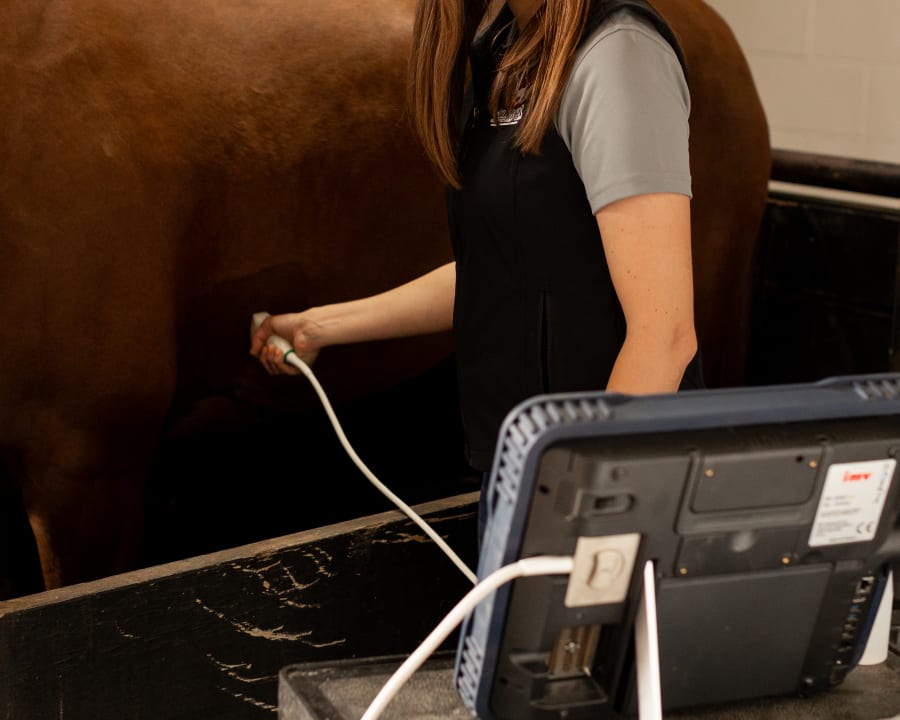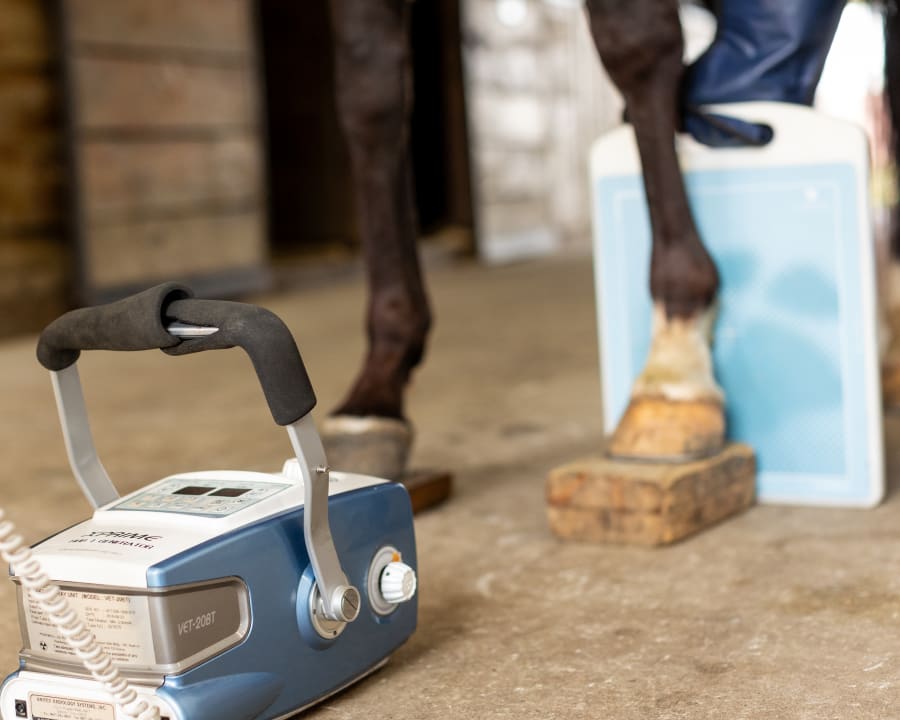Equine Diagnostic Lab
Early diagnosis is beneficial to treating any disease. At Stillwater Equine Veterinary Clinic, we take pride in the multiple modes of diagnostic services we can provide.
Our capabilities include endoscopy, gastroscopy, digital radiography, and digital ultrasonography with color-flow Doppler. Our digital equipment allows us to forward images electronically to referral doctors for updates and specialists for timely second opinions.
All of our diagnostic equipment is portable, so if you can't make it to our equine hospital, all required equipment can travel with our ambulatory services.
You can shop online at our Stillwater veterinary pharmacy to purchase any necessary medication required following a diagnosis.

Mobile Services for Horses in Stillwater & Beyond
If your horse needs veterinary care at your farm, our vets can come to you with trucks equipped with all of the diagnostic technology and tools needed to diagnose your horse's condition.
Learn More
Our Diagnostic Services
In our in-house veterinary diagnostic laboratory and on all of our mobile veterinary vehicles, we are pleased to offer advanced diagnostic testing to provide a diagnosis of your horse's medical issues.
-
Gastroscopy & Endoscopy
Endoscopy and gastroscopy allow a veterinarian to see areas such as the nasal passage, pharynx, trachea, esophagus, stomach, urinary tract, uterus, and bladder.
Using our one-meter Endoscope, we are able to visualize the upper respiratory system, including the sinuses, guttural pouches, and larynx. This allows for early recognition and treatment of many respiratory diseases.
The three-meter scope allows us to visualize the stomach, pylorus, and the uppermost portion of the small intestine. We are then able to detect stomach abnormalities such as ulcers.
-
Radiography (Digital X-rays)
Digital radiology allows instant high-detail radiographs, providing information that often was not visualized on plain film X-rays. Subtle lesions can be examined from the level of individual hairs down to deep bone.
Under high magnification, images remain very clear and margins retain sharp contrast. The “computerized” capability of this system allows us to adjust tones to best match the diagnostic needs of the individual horse and to detect very small problems which are not as visible on traditional X-rays.
Digital radiography services for equine patients both in our hospital and on the farm allow us to diagnose issues such as fractures, laminitis, wounds, foreign objects, and penetration of joints.
-
Ultrasound
We currently use Aloka ultrasound machines for reproduction and a Pico digital ultrasound for lameness evaluation, allowing us to glimpse inside the soft tissue structures. Ultrasound allows for real-time measurement of damaged fibers so that we are better able assess the degree of injury, provide a prognosis, and appropriate treatment plan.
For reproduction, ultrasound allows us to closely monitor and plan for the most likely time of ovulation, allowing for more precise timing of insemination. In addition, ultrasound aids in evaluating your mares reproductive tract for inflammation, infection, and other potential problems.
Ultrasound is also commonly utilized to evaluate the lungs and abdomen. These can be helpful when looking for fluid or abscesses in the lungs. It also allows visualization of some parts of the kidneys and gastrointestinal tract.
-
Cytology
Cytology, which is the study of cells, involves the collection and examination of cells and fluid from organs, tissues, and body cavities. Cells are naturally shed from the surfaces of mucous membranes, organs, and skin lesions, and they can be collected for examination.
Veterinarians can collect fluid and cells from difficult-to-reach tissues like the respiratory tract, the guttural pouch, and the reproductive tract.
Laboratory examination helps characterize the cell types and evaluate the fluid present to determine health or disease status
-
Bloodwork
At our vet lab in Stillwater, we can run several common and specialized blood tests to determine the health of your horse and to diagnose illness.
Some of the most common veterinary blood tests we do are CBC (complete blood count), white blood count, hemoglobin and MCHC (mean corpuscular hemoglobin concentration), hematocrit, platelets, eosinophils, equine blood pregnancy tests, and blood serum profiles.
-
Urinalysis
Urinalysis is a key diagnostic test that provides your vet with essential insights into the physical and chemical properties of your horse's urine.
Urinalysis is primarily used to assess the health of your animal's kidneys and urinary tract system, but it can also help detect issues in other organ systems and is important for diagnosing metabolic diseases like diabetes.
This is a valuable diagnostic test for both healthy and sick animals and should be included in any comprehensive evaluation of your horse's overall health.
-
Fecal Egg Counts
A fecal egg count is the microscopic examination of your horse's feces, which can be done at our in-house vet lab in Stillwater.
A fecal egg count measures the number of strongyle eggs your horse is passing in each gram of his manure. When you send a sample to your veterinarian or independent laboratory, you get back a number like 50 EPG (eggs per gram) or 500 EPG.
Parasites can make horses uncomfortable, and irritable, and lead to more serious conditions.
Annual fecal egg counts protect your horses from problems like colic, weight loss, and diarrhea and protect the pasture from eggs being passed on.
New Patients Welcome
Stillwater Equine Veterinary Clinic is accepting new patients! Whether you bring your horse to our Stillwater hospital or we are providing mobile care, trust that we have the tools and skills to meet your horse's every need.
Contact
Hours
-
Click to View
- Monday:08:00 am - 04:30 pm
- Tuesday:08:00 am - 04:30 pm
- Wednesday:08:00 am - 04:30 pm
- Thursday:08:00 am - 04:30 pm
- Friday:08:00 am - 04:30 pm
- Saturday:08:00 am - 12:00 pm
- Sunday:Closed
